06--中学英语同义词辨析大全(A6)
图片预览
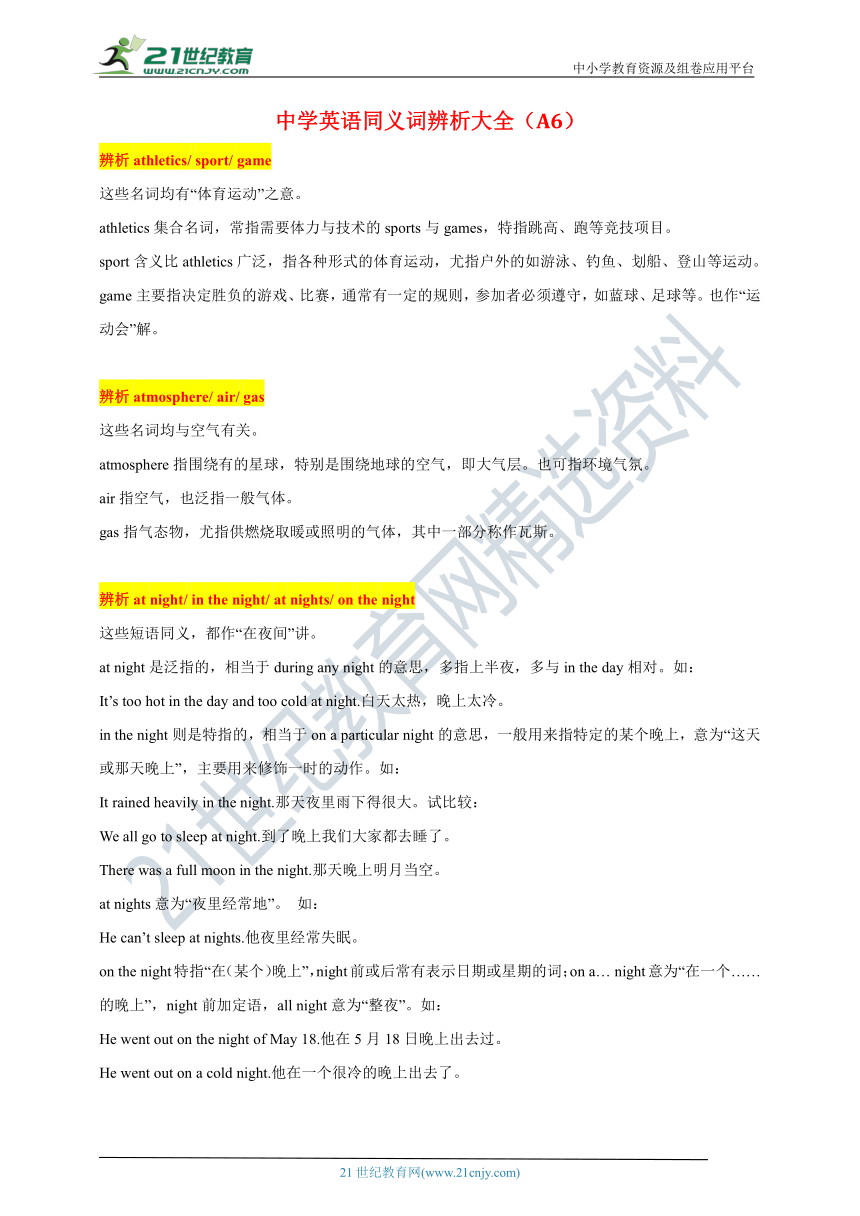
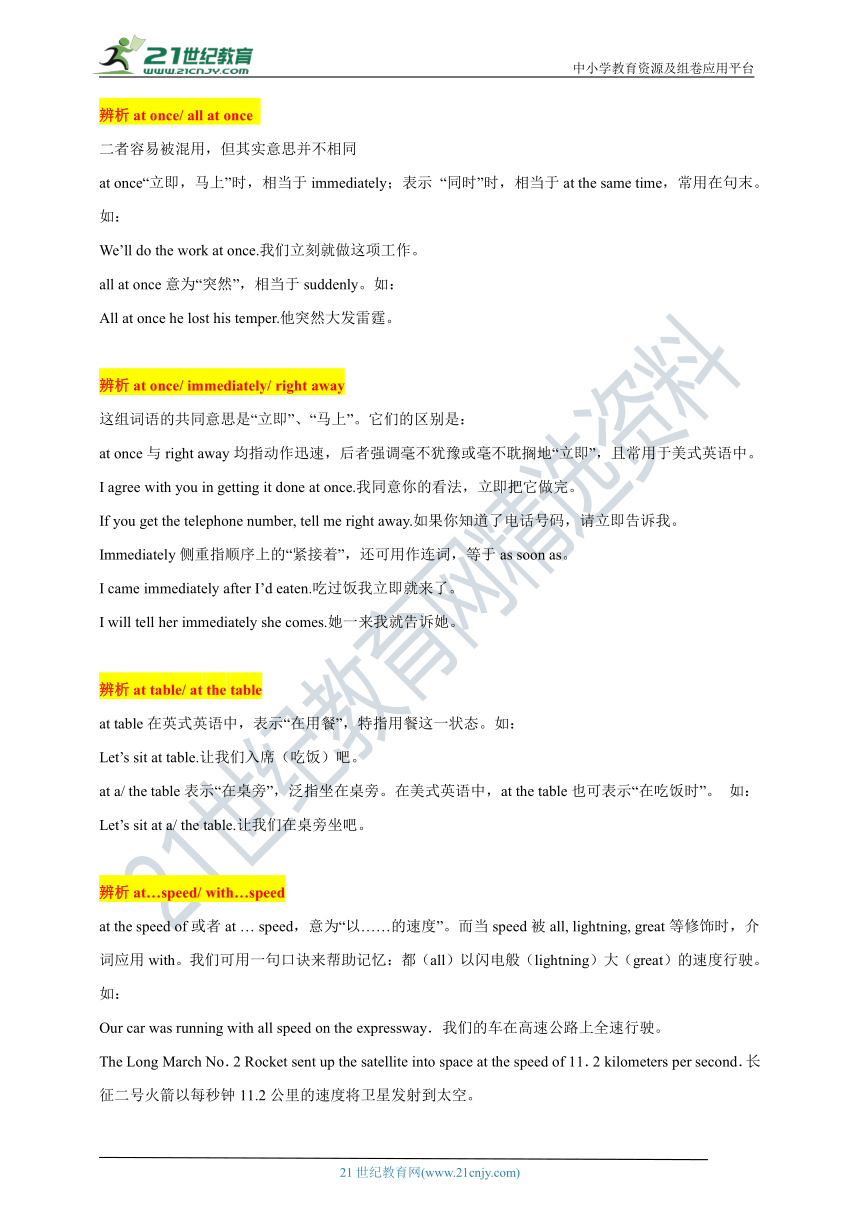
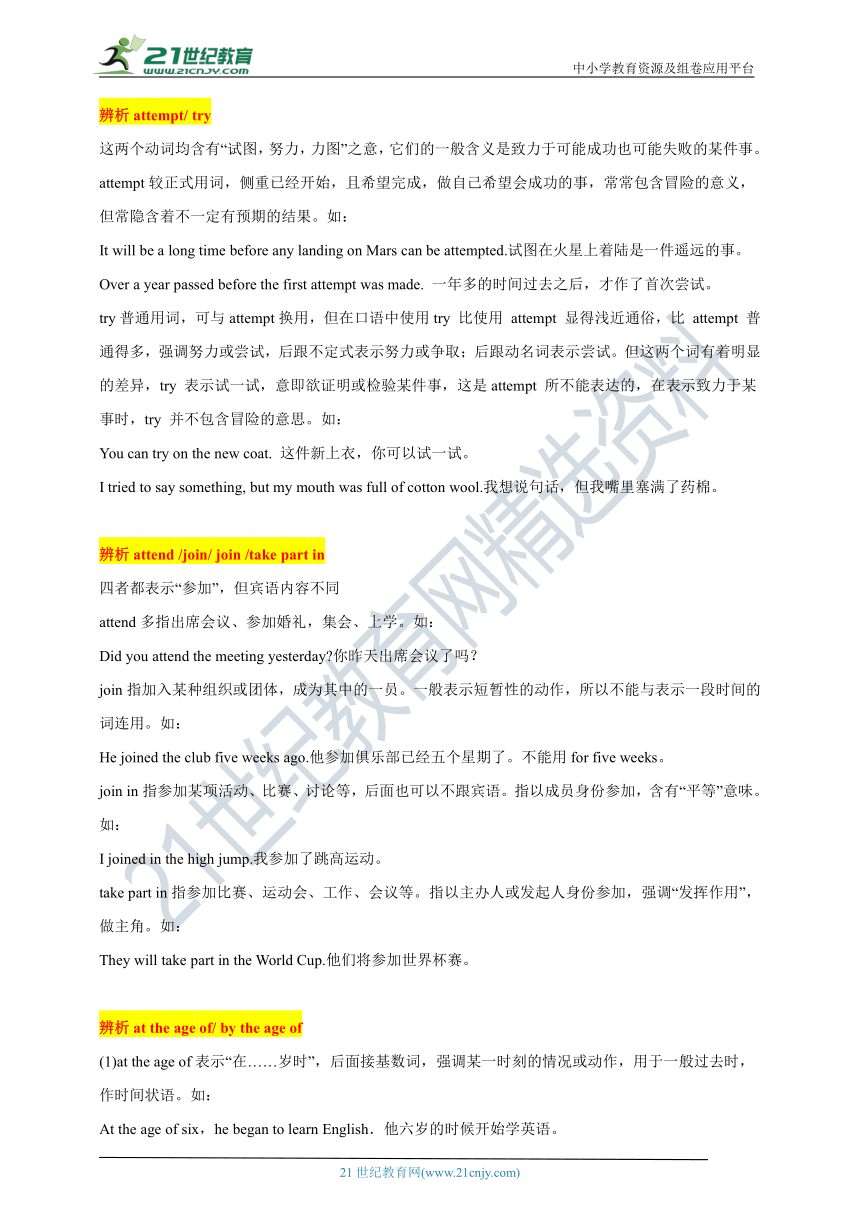
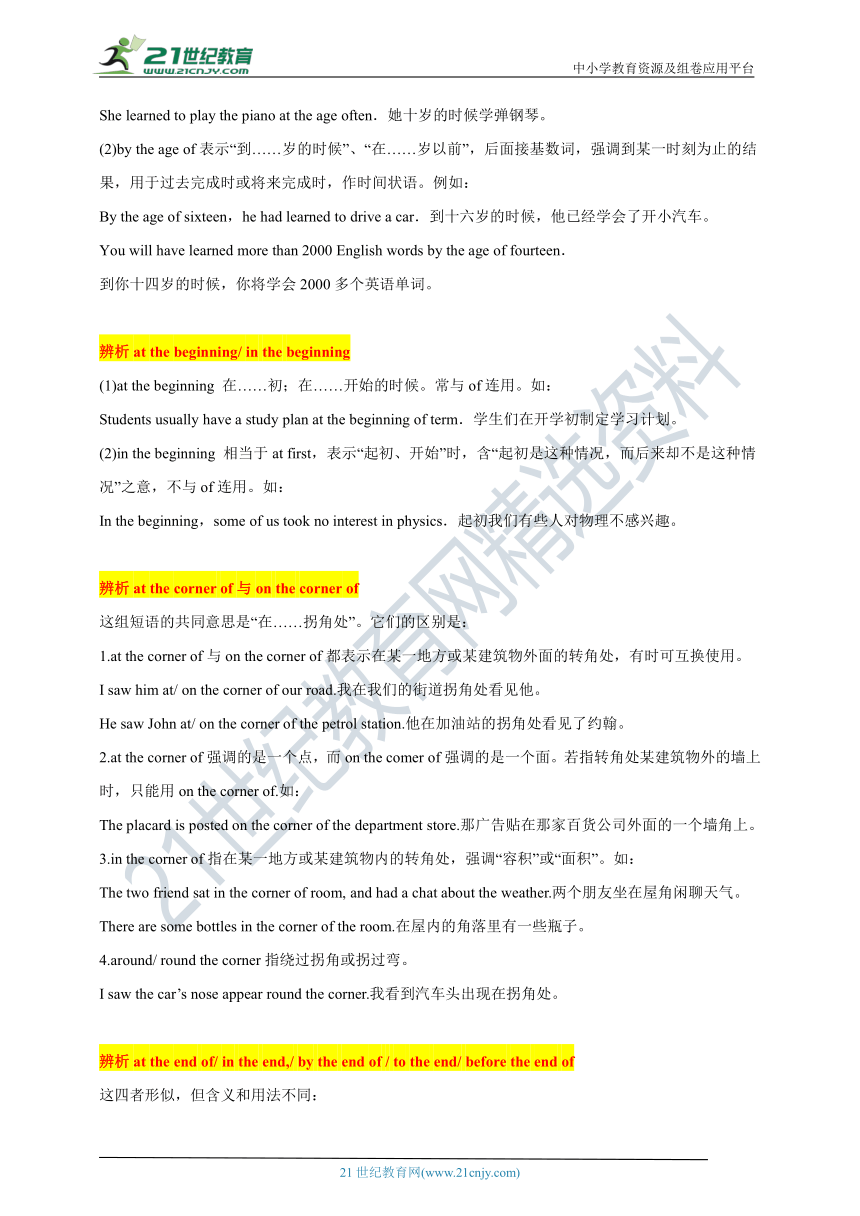
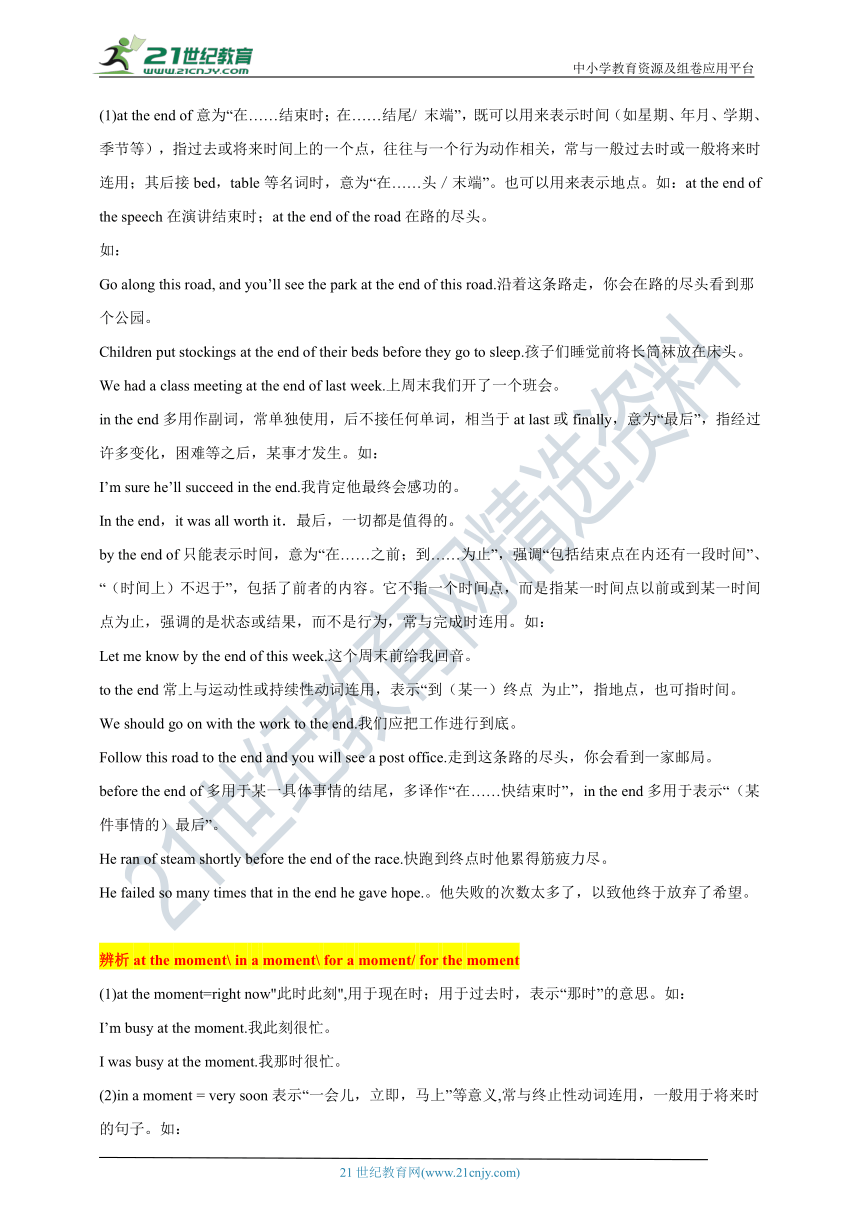
文档简介
中小学教育资源及组卷应用平台
中学英语同义词辨析大全(A6)
辨析athletics/ sport/ game
这些名词均有“体育运动”之意。
athletics集合名词,常指需要体力与技术的sports与games,特指跳高、跑等竞技项目。
sport含义比athletics广泛,指各种形式的体育运动,尤指户外的如游泳、钓鱼、划船、登山等运动。
game主要指决定胜负的游戏、比赛,通常有一定的规则,参加者必须遵守,如蓝球、足球等。也作“运动会”解。
辨析atmosphere/ air/ gas
这些名词均与空气有关。
atmosphere指围绕有的星球,特别是围绕地球的空气,即大气层。也可指环境气氛。
air指空气,也泛指一般气体。
gas指气态物,尤指供燃烧取暖或照明的气体,其中一部分称作瓦斯。
辨析at night/ in the night/ at nights/ on the night
这些短语同义,都作“在夜间”讲。
at night是泛指的,相当于during any night的意思,多指上半夜,多与in the day相对。如:
It’s too hot in the day and too cold at night.白天太热,晚上太冷。
in the night则是特指的,相当于on a particular night的意思,一般用来指特定的某个晚上,意为“这天或那天晚上”,主要用来修饰一时的动作。如:
It rained heavily in the night.那天夜里雨下得很大。试比较:
We all go to sleep at night.到了晚上我们大家都去睡了。
There was a full moon in the night.那天晚上明月当空。
at nights意为“夜里经常地”。 如:
He can’t sleep at nights.他夜里经常失眠。
on the night特指“在(某个)晚上”,night前或后常有表示日期或星期的词;on a… night意为“在一个……的晚上”,night前加定语,all night意为“整夜”。如:
He went out on the night of May 18.他在5月18日晚上出去过。
He went out on a cold night.他在一个很冷的晚上出去了。
辨析at once/ all at once
二者容易被混用,但其实意思并不相同
at once“立即,马上”时,相当于immediately;表示 “同时”时,相当于at the same time,常用在句末。如:
We’ll do the work at once.我们立刻就做这项工作。
all at once意为“突然”,相当于suddenly。如:
All at once he lost his temper.他突然大发雷霆。
辨析at once/ immediately/ right away
这组词语的共同意思是“立即”、“马上”。它们的区别是:
at once与right away均指动作迅速,后者强调毫不犹豫或毫不耽搁地“立即”,且常用于美式英语中。
I agree with you in getting it done at once.我同意你的看法,立即把它做完。
If you get the telephone number, tell me right away.如果你知道了电话号码,请立即告诉我。
Immediately侧重指顺序上的“紧接着”,还可用作连词,等于as soon as。
I came immediately after I’d eaten.吃过饭我立即就来了。
I will tell her immediately she comes.她一来我就告诉她。
辨析at table/ at the table
at table在英式英语中,表示“在用餐”,特指用餐这一状态。如:
Let’s sit at table.让我们入席(吃饭)吧。
at a/ the table表示“在桌旁”,泛指坐在桌旁。在美式英语中,at the table也可表示“在吃饭时”。 如:
Let’s sit at a/ the table.让我们在桌旁坐吧。
辨析at…speed/ with…speed
at the speed of或者at … speed,意为“以……的速度”。而当speed被all, lightning, great等修饰时,介词应用with。我们可用一句口诀来帮助记忆:都(all)以闪电般(lightning)大(great)的速度行驶。如:
Our car was running with all speed on the expressway.我们的车在高速公路上全速行驶。
The Long March No.2 Rocket sent up the satellite into space at the speed of 11.2 kilometers per second.长征二号火箭以每秒钟11.2公里的速度将卫星发射到太空。
辨析attempt/ try
这两个动词均含有“试图,努力,力图”之意,它们的一般含义是致力于可能成功也可能失败的某件事。
attempt较正式用词,侧重已经开始,且希望完成,做自己希望会成功的事,常常包含冒险的意义,但常隐含着不一定有预期的结果。如:
It will be a long time before any landing on Mars can be attempted.试图在火星上着陆是一件遥远的事。
Over a year passed before the first attempt was made. 一年多的时间过去之后,才作了首次尝试。
try普通用词,可与attempt换用,但在口语中使用try 比使用 attempt 显得浅近通俗,比 attempt 普通得多,强调努力或尝试,后跟不定式表示努力或争取;后跟动名词表示尝试。但这两个词有着明显的差异,try 表示试一试,意即欲证明或检验某件事,这是attempt 所不能表达的,在表示致力于某事时,try 并不包含冒险的意思。如:
You can try on the new coat. 这件新上衣,你可以试一试。
I tried to say something, but my mouth was full of cotton wool.我想说句话,但我嘴里塞满了药棉。
辨析attend /join/ join /take part in
四者都表示“参加”,但宾语内容不同
attend多指出席会议、参加婚礼,集会、上学。如:
Did you attend the meeting yesterday 你昨天出席会议了吗?
join指加入某种组织或团体,成为其中的一员。一般表示短暂性的动作,所以不能与表示一段时间的词连用。如:
He joined the club five weeks ago.他参加俱乐部已经五个星期了。不能用for five weeks。
join in指参加某项活动、比赛、讨论等,后面也可以不跟宾语。指以成员身份参加,含有“平等”意味。如:
I joined in the high jump.我参加了跳高运动。
take part in指参加比赛、运动会、工作、会议等。指以主办人或发起人身份参加,强调“发挥作用”,做主角。如:
They will take part in the World Cup.他们将参加世界杯赛。
辨析at the age of/ by the age of
(1)at the age of表示“在……岁时”,后面接基数词,强调某一时刻的情况或动作,用于一般过去时,作时间状语。如:
At the age of six,he began to learn English.他六岁的时候开始学英语。
She learned to play the piano at the age often.她十岁的时候学弹钢琴。
(2)by the age of表示“到……岁的时候”、“在……岁以前”,后面接基数词,强调到某一时刻为止的结果,用于过去完成时或将来完成时,作时间状语。例如:
By the age of sixteen,he had learned to drive a car.到十六岁的时候,他已经学会了开小汽车。
You will have learned more than 2000 English words by the age of fourteen.
到你十四岁的时候,你将学会2000多个英语单词。
辨析at the beginning/ in the beginning
(1)at the beginning 在……初;在……开始的时候。常与of连用。如:
Students usually have a study plan at the beginning of term.学生们在开学初制定学习计划。
(2)in the beginning 相当于at first,表示“起初、开始”时,含“起初是这种情况,而后来却不是这种情况”之意,不与of连用。如:
In the beginning,some of us took no interest in physics.起初我们有些人对物理不感兴趣。
辨析at the corner of与on the corner of
这组短语的共同意思是“在……拐角处”。它们的区别是:
1.at the corner of与on the corner of都表示在某一地方或某建筑物外面的转角处,有时可互换使用。
I saw him at/ on the corner of our road.我在我们的街道拐角处看见他。
He saw John at/ on the corner of the petrol station.他在加油站的拐角处看见了约翰。
2.at the corner of强调的是一个点,而on the comer of强调的是一个面。若指转角处某建筑物外的墙上时,只能用on the corner of.如:
The placard is posted on the corner of the department store.那广告贴在那家百货公司外面的一个墙角上。
3.in the corner of指在某一地方或某建筑物内的转角处,强调“容积”或“面积”。如:
The two friend sat in the corner of room, and had a chat about the weather.两个朋友坐在屋角闲聊天气。
There are some bottles in the corner of the room.在屋内的角落里有一些瓶子。
4.around/ round the corner指绕过拐角或拐过弯。
I saw the car’s nose appear round the corner.我看到汽车头出现在拐角处。
辨析at the end of/ in the end,/ by the end of / to the end/ before the end of
这四者形似,但含义和用法不同:
(1)at the end of意为“在……结束时;在……结尾/ 末端”,既可以用来表示时间(如星期、年月、学期、季节等),指过去或将来时间上的一个点,往往与一个行为动作相关,常与一般过去时或一般将来时连用;其后接bed,table等名词时,意为“在……头/末端”。也可以用来表示地点。如:at the end of the speech在演讲结束时;at the end of the road在路的尽头。
如:
Go along this road, and you’ll see the park at the end of this road.沿着这条路走,你会在路的尽头看到那个公园。
Children put stockings at the end of their beds before they go to sleep.孩子们睡觉前将长筒袜放在床头。
We had a class meeting at the end of last week.上周末我们开了一个班会。
in the end多用作副词,常单独使用,后不接任何单词,相当于at last或finally,意为“最后”,指经过许多变化,困难等之后,某事才发生。如:
I’m sure he’ll succeed in the end.我肯定他最终会感功的。
In the end,it was all worth it.最后,一切都是值得的。
by the end of只能表示时间,意为“在……之前;到……为止”,强调“包括结束点在内还有一段时间”、“(时间上)不迟于”,包括了前者的内容。它不指一个时间点,而是指某一时间点以前或到某一时间点为止,强调的是状态或结果,而不是行为,常与完成时连用。如:
Let me know by the end of this week.这个周末前给我回音。
to the end常上与运动性或持续性动词连用,表示“到(某一)终点 为止”,指地点,也可指时间。
We should go on with the work to the end.我们应把工作进行到底。
Follow this road to the end and you will see a post office.走到这条路的尽头,你会看到一家邮局。
before the end of多用于某一具体事情的结尾,多译作“在……快结束时”,in the end多用于表示“(某件事情的)最后”。
He ran of steam shortly before the end of the race.快跑到终点时他累得筋疲力尽。
He failed so many times that in the end he gave hope.。他失败的次数太多了,以致他终于放弃了希望。
辨析at the moment\ in a moment\ for a moment/ for the moment
(1)at the moment=right now"此时此刻",用于现在时;用于过去时,表示“那时”的意思。如:
I’m busy at the moment.我此刻很忙。
I was busy at the moment.我那时很忙。
(2)in a moment = very soon表示“一会儿,立即,马上”等意义,常与终止性动词连用,一般用于将来时的句子。如:
I’ll come back in a moment.我马上就回来。
He’ll meet you in a moment .他一会就见你。
(3)for a moment “此刻,一会儿”表示时间的延续,常与持续性动词连用。如:
Please wait for a moment.请等一下。
He read the paper for a moment and went out.他看了一会儿报纸,就出去了。
(4)for the moment常用于进行时,意为“暂时,目前”。如:
Stop discussing for the moment, please.请暂停讨论。
Let’s leave things as they are for the moment.让我们暂时维持现状吧。
辨析at the time/ at that time/ at one time/ at a time
(1)at the time通常用于过去时句子中,指某件事情发生的“当时”、“那时”。如:
Many people saw the strange thing happen at the time. 当时,许多人都看到了这件奇怪的事情的发生。
有时,at the time的后面可接“of…”短语。这时,它表示“在(某事态)发生的时候”或“在……的时代”。如:
Were you in San Francisco at the time of the big earth quake in 1989 1989年旧金山发生地震时,你在那里吗?
It happened at the time of King Alfred.事情发生在阿尔弗雷德国王时期。
(2)at that time 则通常指前文明确提到的某个时期、时候。通常其后不带“of…”短语。如:
In the 17th century much corn was grown in Tibet and Sichuan.At that time(=At the 17th century) the land along the Changjiang River was becoming very crowded.
(3)at one time=during a period of time in the past意为“过去有一段时期”,“曾经”。如:
They used to be good friends at one time. 他们曾经是好朋友。
(4)at a time则意为“一次”,表示一个时间单位。它常与表示数量的词语连用,表示频率。如:
Don’t speak all at once.One at a time, please.不要同时一起说。一次只一个人说。
Take the medicine three times a day and three pieces at a time.这些药每天服三次,每次服三粒。
辨析at the top of/ on the top of/ on top of
这组短语的区别是:
1.on the top of表示“在……上面”,on用来表示一个面。
Clouds are forming on the top of the hill.云正在山顶上形成。
2.at the top of表示“在……顶端”、“在……最上方”、“名列……之前”,at表示一个点,范围比on窄。
A statue of Nelson stands at the top of Nelson’s Column.纳尔逊雕像矗立在纳尔逊纪念柱顶端。
His name was at the top of the list.他的名字高列榜首。
His sits at the top of the table.他坐在首席。
3.on top of可表示“驾驭,熟练掌握”
The girl secretary is on top of her job.这个女秘书能胜任她的工作。
辨析at times/ on time/ in time
at times意为“有时”相当于sometimes。
on time强调“准时;按时”相当于at the right time。
in time意为“及时”,指正赶上时候或恰在需要的时候。
辨析author/ writer
这两个名词均有“作者,作家”之意。
author泛指用自己名字或笔名发表过作品的人,不强调是否以写作为主职业。
writer含义广泛,一般指以写作为职业的人。
辨析autumn/ fall
这两个名词均含“秋天”之意。
“autumn”跟“fall”的区别:autumn和fall这两个词的区别在于使用地区的不同,前者为英国用词,后者是美国英语。autumn是比较正式的书面用语,是英式英语表达。“秋季 秋天”名词是它的唯一属性;而fall当它表达为“秋季 秋天”的时候,是一种口语化用词,是地道的美式英语的表达。它的主要词性是动词,主要意思有“落下 倒下,下垂 低垂,减少 下降”等等。
1. Winter comes after autumn.秋去冬来。
2. The fall of one leaf is enough to tell coming of autumn.一叶知秋。
3. American people use the word “fall” to mean autumn.美国人用“fall”这个字来表示秋天。
辨析awake/ wake
两者都与“醒来”有关,但词性和用法有所不同。
awake作形容词时,意为“醒着的”,在句中常用在系动词后作表语,表示未入睡或醒着的状态。反义词为asleep,意为“睡着的”。作及物动词或不及物动词,意为“醒来,唤醒”。如:
It was eleven o’clock, but she was still awake.11点了,可她还是睡不着。
A great noise awoke the baby.嘈杂声把孩子闹醒了。
wake是动词,意为“吵醒,唤醒,醒来,使……醒来”,常与副词up连用。wake up意为“醒来”;wake sb. up意为“使某人醒来”。当宾语是代词时,放在wake与up中间。如:
But before long, he camel woke him.但是不久,骆驼就把他弄醒了。
Don’t wake him up. He fell asleep just now.别叫醒他,他刚刚睡着。
辨析baby/ child
这两个名词均有“孩子”之意。
baby :日常用词,一般指从刚出生的婴儿到满两岁的或非常小的孩子,常含钟爱意味。如:
The baby's crying!婴儿在哭!
a newborn baby。新生儿
child :普通用词,含义广,无感彩。泛指从胎儿、婴儿到10岁左右的儿童。
an eight-year-old child 8岁的小孩
As a child I didn't eat vegetables.我小时候不爱吃蔬菜。
辨析back/ backward/ hind/ behind
这些词均有“在后,向后”之意,但侧重点不同。
back做副词或形容词,意为“在后,向后”,强调所修饰物的位置以及动作运动方向。如:
Stand back to allow the procession to pass.往后站,让队伍通过。
We passed a garage, about a mile back.我们经过了一个车库,大约有一英里远了。
backward可用于人或物,指向后的,落后的或迟钝的。如:
hind指成对并且分前后的东西的“后面的”。如:
behind既作介词又作副词,意为“后面”,指一物同它物相对的位置或场所。如:
Don’t look behind, or you may fall.别回头看,不然要跌倒的。
辨析bad/ badly
这两个词的共同意思是“坏,不好;很,未,非常”。它们的区别是:
bad通常用作形容词,可修饰品质、健康、质量、天气状况等。如:
She’s not so bad at singing.她唱得不算坏。
Those bad elements were not born bad.那些坏分子并不是生来就坏。
Smoking bad for the heath.吸烟不利于健康。
Are you hurt bad 你伤得厉害吗?
badly是副词,与play,work,sing等连用意思是“不好”,与need,want,require等连用意思是“很,非常”。
She played badly in the first set, but then she turned the tables on her opponent and won on the match.第一局她打得很糟,可是后来她扭转了局势赢了这场比赛。
We wanted money badly to buy the machines we needed.我们迫切需要钱购买我们需要的机器。
I slept very badly我睡得很不好。
辨析bag/ handbag/ purse
这些名词均含“袋”之意。
bag普通用词,指一般的口袋,有时也指手提包。如:
a black plastic rubbish/garbage bag一只黑色塑料垃圾袋
a shopping bag购物袋
handbag指手提包,尤指女人用的手提包。如:
The slim line diary fits easily into a handbag.这本细长的日记本很容易装进手提包里。
She stared at the floor, idly playing with the strap of her handbag.她眼睛盯着地板,漫不经心地摆弄着手提包的带子。
purse指钱包或小钱袋,在美国相当于handbag。如:
I took a coin out of my purse and gave it to the child.我从钱包取出一枚硬币给那个小孩。
She looked at me and then reached in her purse for cigarettes.她看看我,接着伸手去包里拿香烟。
21世纪教育网 www.21cnjy.com 精品试卷·第 2 页 (共 2 页)
HYPERLINK "http://21世纪教育网(www.21cnjy.com)
" 21世纪教育网(www.21cnjy.com)
中学英语同义词辨析大全(A6)
辨析athletics/ sport/ game
这些名词均有“体育运动”之意。
athletics集合名词,常指需要体力与技术的sports与games,特指跳高、跑等竞技项目。
sport含义比athletics广泛,指各种形式的体育运动,尤指户外的如游泳、钓鱼、划船、登山等运动。
game主要指决定胜负的游戏、比赛,通常有一定的规则,参加者必须遵守,如蓝球、足球等。也作“运动会”解。
辨析atmosphere/ air/ gas
这些名词均与空气有关。
atmosphere指围绕有的星球,特别是围绕地球的空气,即大气层。也可指环境气氛。
air指空气,也泛指一般气体。
gas指气态物,尤指供燃烧取暖或照明的气体,其中一部分称作瓦斯。
辨析at night/ in the night/ at nights/ on the night
这些短语同义,都作“在夜间”讲。
at night是泛指的,相当于during any night的意思,多指上半夜,多与in the day相对。如:
It’s too hot in the day and too cold at night.白天太热,晚上太冷。
in the night则是特指的,相当于on a particular night的意思,一般用来指特定的某个晚上,意为“这天或那天晚上”,主要用来修饰一时的动作。如:
It rained heavily in the night.那天夜里雨下得很大。试比较:
We all go to sleep at night.到了晚上我们大家都去睡了。
There was a full moon in the night.那天晚上明月当空。
at nights意为“夜里经常地”。 如:
He can’t sleep at nights.他夜里经常失眠。
on the night特指“在(某个)晚上”,night前或后常有表示日期或星期的词;on a… night意为“在一个……的晚上”,night前加定语,all night意为“整夜”。如:
He went out on the night of May 18.他在5月18日晚上出去过。
He went out on a cold night.他在一个很冷的晚上出去了。
辨析at once/ all at once
二者容易被混用,但其实意思并不相同
at once“立即,马上”时,相当于immediately;表示 “同时”时,相当于at the same time,常用在句末。如:
We’ll do the work at once.我们立刻就做这项工作。
all at once意为“突然”,相当于suddenly。如:
All at once he lost his temper.他突然大发雷霆。
辨析at once/ immediately/ right away
这组词语的共同意思是“立即”、“马上”。它们的区别是:
at once与right away均指动作迅速,后者强调毫不犹豫或毫不耽搁地“立即”,且常用于美式英语中。
I agree with you in getting it done at once.我同意你的看法,立即把它做完。
If you get the telephone number, tell me right away.如果你知道了电话号码,请立即告诉我。
Immediately侧重指顺序上的“紧接着”,还可用作连词,等于as soon as。
I came immediately after I’d eaten.吃过饭我立即就来了。
I will tell her immediately she comes.她一来我就告诉她。
辨析at table/ at the table
at table在英式英语中,表示“在用餐”,特指用餐这一状态。如:
Let’s sit at table.让我们入席(吃饭)吧。
at a/ the table表示“在桌旁”,泛指坐在桌旁。在美式英语中,at the table也可表示“在吃饭时”。 如:
Let’s sit at a/ the table.让我们在桌旁坐吧。
辨析at…speed/ with…speed
at the speed of或者at … speed,意为“以……的速度”。而当speed被all, lightning, great等修饰时,介词应用with。我们可用一句口诀来帮助记忆:都(all)以闪电般(lightning)大(great)的速度行驶。如:
Our car was running with all speed on the expressway.我们的车在高速公路上全速行驶。
The Long March No.2 Rocket sent up the satellite into space at the speed of 11.2 kilometers per second.长征二号火箭以每秒钟11.2公里的速度将卫星发射到太空。
辨析attempt/ try
这两个动词均含有“试图,努力,力图”之意,它们的一般含义是致力于可能成功也可能失败的某件事。
attempt较正式用词,侧重已经开始,且希望完成,做自己希望会成功的事,常常包含冒险的意义,但常隐含着不一定有预期的结果。如:
It will be a long time before any landing on Mars can be attempted.试图在火星上着陆是一件遥远的事。
Over a year passed before the first attempt was made. 一年多的时间过去之后,才作了首次尝试。
try普通用词,可与attempt换用,但在口语中使用try 比使用 attempt 显得浅近通俗,比 attempt 普通得多,强调努力或尝试,后跟不定式表示努力或争取;后跟动名词表示尝试。但这两个词有着明显的差异,try 表示试一试,意即欲证明或检验某件事,这是attempt 所不能表达的,在表示致力于某事时,try 并不包含冒险的意思。如:
You can try on the new coat. 这件新上衣,你可以试一试。
I tried to say something, but my mouth was full of cotton wool.我想说句话,但我嘴里塞满了药棉。
辨析attend /join/ join /take part in
四者都表示“参加”,但宾语内容不同
attend多指出席会议、参加婚礼,集会、上学。如:
Did you attend the meeting yesterday 你昨天出席会议了吗?
join指加入某种组织或团体,成为其中的一员。一般表示短暂性的动作,所以不能与表示一段时间的词连用。如:
He joined the club five weeks ago.他参加俱乐部已经五个星期了。不能用for five weeks。
join in指参加某项活动、比赛、讨论等,后面也可以不跟宾语。指以成员身份参加,含有“平等”意味。如:
I joined in the high jump.我参加了跳高运动。
take part in指参加比赛、运动会、工作、会议等。指以主办人或发起人身份参加,强调“发挥作用”,做主角。如:
They will take part in the World Cup.他们将参加世界杯赛。
辨析at the age of/ by the age of
(1)at the age of表示“在……岁时”,后面接基数词,强调某一时刻的情况或动作,用于一般过去时,作时间状语。如:
At the age of six,he began to learn English.他六岁的时候开始学英语。
She learned to play the piano at the age often.她十岁的时候学弹钢琴。
(2)by the age of表示“到……岁的时候”、“在……岁以前”,后面接基数词,强调到某一时刻为止的结果,用于过去完成时或将来完成时,作时间状语。例如:
By the age of sixteen,he had learned to drive a car.到十六岁的时候,他已经学会了开小汽车。
You will have learned more than 2000 English words by the age of fourteen.
到你十四岁的时候,你将学会2000多个英语单词。
辨析at the beginning/ in the beginning
(1)at the beginning 在……初;在……开始的时候。常与of连用。如:
Students usually have a study plan at the beginning of term.学生们在开学初制定学习计划。
(2)in the beginning 相当于at first,表示“起初、开始”时,含“起初是这种情况,而后来却不是这种情况”之意,不与of连用。如:
In the beginning,some of us took no interest in physics.起初我们有些人对物理不感兴趣。
辨析at the corner of与on the corner of
这组短语的共同意思是“在……拐角处”。它们的区别是:
1.at the corner of与on the corner of都表示在某一地方或某建筑物外面的转角处,有时可互换使用。
I saw him at/ on the corner of our road.我在我们的街道拐角处看见他。
He saw John at/ on the corner of the petrol station.他在加油站的拐角处看见了约翰。
2.at the corner of强调的是一个点,而on the comer of强调的是一个面。若指转角处某建筑物外的墙上时,只能用on the corner of.如:
The placard is posted on the corner of the department store.那广告贴在那家百货公司外面的一个墙角上。
3.in the corner of指在某一地方或某建筑物内的转角处,强调“容积”或“面积”。如:
The two friend sat in the corner of room, and had a chat about the weather.两个朋友坐在屋角闲聊天气。
There are some bottles in the corner of the room.在屋内的角落里有一些瓶子。
4.around/ round the corner指绕过拐角或拐过弯。
I saw the car’s nose appear round the corner.我看到汽车头出现在拐角处。
辨析at the end of/ in the end,/ by the end of / to the end/ before the end of
这四者形似,但含义和用法不同:
(1)at the end of意为“在……结束时;在……结尾/ 末端”,既可以用来表示时间(如星期、年月、学期、季节等),指过去或将来时间上的一个点,往往与一个行为动作相关,常与一般过去时或一般将来时连用;其后接bed,table等名词时,意为“在……头/末端”。也可以用来表示地点。如:at the end of the speech在演讲结束时;at the end of the road在路的尽头。
如:
Go along this road, and you’ll see the park at the end of this road.沿着这条路走,你会在路的尽头看到那个公园。
Children put stockings at the end of their beds before they go to sleep.孩子们睡觉前将长筒袜放在床头。
We had a class meeting at the end of last week.上周末我们开了一个班会。
in the end多用作副词,常单独使用,后不接任何单词,相当于at last或finally,意为“最后”,指经过许多变化,困难等之后,某事才发生。如:
I’m sure he’ll succeed in the end.我肯定他最终会感功的。
In the end,it was all worth it.最后,一切都是值得的。
by the end of只能表示时间,意为“在……之前;到……为止”,强调“包括结束点在内还有一段时间”、“(时间上)不迟于”,包括了前者的内容。它不指一个时间点,而是指某一时间点以前或到某一时间点为止,强调的是状态或结果,而不是行为,常与完成时连用。如:
Let me know by the end of this week.这个周末前给我回音。
to the end常上与运动性或持续性动词连用,表示“到(某一)终点 为止”,指地点,也可指时间。
We should go on with the work to the end.我们应把工作进行到底。
Follow this road to the end and you will see a post office.走到这条路的尽头,你会看到一家邮局。
before the end of多用于某一具体事情的结尾,多译作“在……快结束时”,in the end多用于表示“(某件事情的)最后”。
He ran of steam shortly before the end of the race.快跑到终点时他累得筋疲力尽。
He failed so many times that in the end he gave hope.。他失败的次数太多了,以致他终于放弃了希望。
辨析at the moment\ in a moment\ for a moment/ for the moment
(1)at the moment=right now"此时此刻",用于现在时;用于过去时,表示“那时”的意思。如:
I’m busy at the moment.我此刻很忙。
I was busy at the moment.我那时很忙。
(2)in a moment = very soon表示“一会儿,立即,马上”等意义,常与终止性动词连用,一般用于将来时的句子。如:
I’ll come back in a moment.我马上就回来。
He’ll meet you in a moment .他一会就见你。
(3)for a moment “此刻,一会儿”表示时间的延续,常与持续性动词连用。如:
Please wait for a moment.请等一下。
He read the paper for a moment and went out.他看了一会儿报纸,就出去了。
(4)for the moment常用于进行时,意为“暂时,目前”。如:
Stop discussing for the moment, please.请暂停讨论。
Let’s leave things as they are for the moment.让我们暂时维持现状吧。
辨析at the time/ at that time/ at one time/ at a time
(1)at the time通常用于过去时句子中,指某件事情发生的“当时”、“那时”。如:
Many people saw the strange thing happen at the time. 当时,许多人都看到了这件奇怪的事情的发生。
有时,at the time的后面可接“of…”短语。这时,它表示“在(某事态)发生的时候”或“在……的时代”。如:
Were you in San Francisco at the time of the big earth quake in 1989 1989年旧金山发生地震时,你在那里吗?
It happened at the time of King Alfred.事情发生在阿尔弗雷德国王时期。
(2)at that time 则通常指前文明确提到的某个时期、时候。通常其后不带“of…”短语。如:
In the 17th century much corn was grown in Tibet and Sichuan.At that time(=At the 17th century) the land along the Changjiang River was becoming very crowded.
(3)at one time=during a period of time in the past意为“过去有一段时期”,“曾经”。如:
They used to be good friends at one time. 他们曾经是好朋友。
(4)at a time则意为“一次”,表示一个时间单位。它常与表示数量的词语连用,表示频率。如:
Don’t speak all at once.One at a time, please.不要同时一起说。一次只一个人说。
Take the medicine three times a day and three pieces at a time.这些药每天服三次,每次服三粒。
辨析at the top of/ on the top of/ on top of
这组短语的区别是:
1.on the top of表示“在……上面”,on用来表示一个面。
Clouds are forming on the top of the hill.云正在山顶上形成。
2.at the top of表示“在……顶端”、“在……最上方”、“名列……之前”,at表示一个点,范围比on窄。
A statue of Nelson stands at the top of Nelson’s Column.纳尔逊雕像矗立在纳尔逊纪念柱顶端。
His name was at the top of the list.他的名字高列榜首。
His sits at the top of the table.他坐在首席。
3.on top of可表示“驾驭,熟练掌握”
The girl secretary is on top of her job.这个女秘书能胜任她的工作。
辨析at times/ on time/ in time
at times意为“有时”相当于sometimes。
on time强调“准时;按时”相当于at the right time。
in time意为“及时”,指正赶上时候或恰在需要的时候。
辨析author/ writer
这两个名词均有“作者,作家”之意。
author泛指用自己名字或笔名发表过作品的人,不强调是否以写作为主职业。
writer含义广泛,一般指以写作为职业的人。
辨析autumn/ fall
这两个名词均含“秋天”之意。
“autumn”跟“fall”的区别:autumn和fall这两个词的区别在于使用地区的不同,前者为英国用词,后者是美国英语。autumn是比较正式的书面用语,是英式英语表达。“秋季 秋天”名词是它的唯一属性;而fall当它表达为“秋季 秋天”的时候,是一种口语化用词,是地道的美式英语的表达。它的主要词性是动词,主要意思有“落下 倒下,下垂 低垂,减少 下降”等等。
1. Winter comes after autumn.秋去冬来。
2. The fall of one leaf is enough to tell coming of autumn.一叶知秋。
3. American people use the word “fall” to mean autumn.美国人用“fall”这个字来表示秋天。
辨析awake/ wake
两者都与“醒来”有关,但词性和用法有所不同。
awake作形容词时,意为“醒着的”,在句中常用在系动词后作表语,表示未入睡或醒着的状态。反义词为asleep,意为“睡着的”。作及物动词或不及物动词,意为“醒来,唤醒”。如:
It was eleven o’clock, but she was still awake.11点了,可她还是睡不着。
A great noise awoke the baby.嘈杂声把孩子闹醒了。
wake是动词,意为“吵醒,唤醒,醒来,使……醒来”,常与副词up连用。wake up意为“醒来”;wake sb. up意为“使某人醒来”。当宾语是代词时,放在wake与up中间。如:
But before long, he camel woke him.但是不久,骆驼就把他弄醒了。
Don’t wake him up. He fell asleep just now.别叫醒他,他刚刚睡着。
辨析baby/ child
这两个名词均有“孩子”之意。
baby :日常用词,一般指从刚出生的婴儿到满两岁的或非常小的孩子,常含钟爱意味。如:
The baby's crying!婴儿在哭!
a newborn baby。新生儿
child :普通用词,含义广,无感彩。泛指从胎儿、婴儿到10岁左右的儿童。
an eight-year-old child 8岁的小孩
As a child I didn't eat vegetables.我小时候不爱吃蔬菜。
辨析back/ backward/ hind/ behind
这些词均有“在后,向后”之意,但侧重点不同。
back做副词或形容词,意为“在后,向后”,强调所修饰物的位置以及动作运动方向。如:
Stand back to allow the procession to pass.往后站,让队伍通过。
We passed a garage, about a mile back.我们经过了一个车库,大约有一英里远了。
backward可用于人或物,指向后的,落后的或迟钝的。如:
hind指成对并且分前后的东西的“后面的”。如:
behind既作介词又作副词,意为“后面”,指一物同它物相对的位置或场所。如:
Don’t look behind, or you may fall.别回头看,不然要跌倒的。
辨析bad/ badly
这两个词的共同意思是“坏,不好;很,未,非常”。它们的区别是:
bad通常用作形容词,可修饰品质、健康、质量、天气状况等。如:
She’s not so bad at singing.她唱得不算坏。
Those bad elements were not born bad.那些坏分子并不是生来就坏。
Smoking bad for the heath.吸烟不利于健康。
Are you hurt bad 你伤得厉害吗?
badly是副词,与play,work,sing等连用意思是“不好”,与need,want,require等连用意思是“很,非常”。
She played badly in the first set, but then she turned the tables on her opponent and won on the match.第一局她打得很糟,可是后来她扭转了局势赢了这场比赛。
We wanted money badly to buy the machines we needed.我们迫切需要钱购买我们需要的机器。
I slept very badly我睡得很不好。
辨析bag/ handbag/ purse
这些名词均含“袋”之意。
bag普通用词,指一般的口袋,有时也指手提包。如:
a black plastic rubbish/garbage bag一只黑色塑料垃圾袋
a shopping bag购物袋
handbag指手提包,尤指女人用的手提包。如:
The slim line diary fits easily into a handbag.这本细长的日记本很容易装进手提包里。
She stared at the floor, idly playing with the strap of her handbag.她眼睛盯着地板,漫不经心地摆弄着手提包的带子。
purse指钱包或小钱袋,在美国相当于handbag。如:
I took a coin out of my purse and gave it to the child.我从钱包取出一枚硬币给那个小孩。
She looked at me and then reached in her purse for cigarettes.她看看我,接着伸手去包里拿香烟。
21世纪教育网 www.21cnjy.com 精品试卷·第 2 页 (共 2 页)
HYPERLINK "http://21世纪教育网(www.21cnjy.com)
" 21世纪教育网(www.21cnjy.com)
同课章节目录
- 词法
- 名词
- 动词和动词短语
- 动词语态
- 动词时态
- 助动词和情态动词
- 非谓语动词
- 冠词
- 代词
- 数词和量词
- 形容词副词及其比较等级
- 介词和介词短语
- 连词和感叹词
- 构词法
- 相似、相近词比较
- 句法
- 陈述句
- 一般疑问句和否定疑问句
- 特殊疑问句及选择疑问句
- 反意疑问句
- 存在句(There be句型)
- 宾语从句
- 定语从句
- 状语从句
- 主谓一致问题
- 简单句
- 并列句
- 复合句
- 主谓一致
- 主、表语从句
- 名词性从句
- 直接引语和间接引语
- 虚拟语气
- 感叹句
- 强调句
- 倒装句
- 祈使句
- 句子的成分
- 句子的分类
- 题型专区
- 单项选择部分
- 易错题
- 完形填空
- 阅读理解
- 词汇练习
- 听说训练
- 句型转换
- 补全对话
- 短文改错
- 翻译
- 书面表达
- 任务型阅读
- 语法填空
- 其他资料
